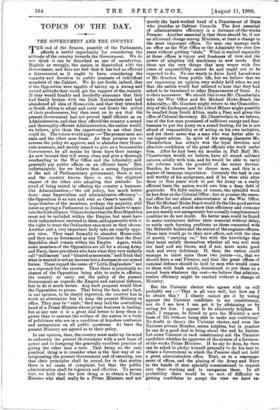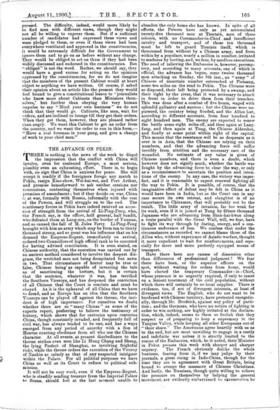TOPICS OF THE DAY.
THE GOVERNMENT AND THE COUNTRY. THE end of the Session, possibly of the Parliament, affords a useful opportunity for considering the attitude of the country towards the Government. We do not think it can be described as one of satisfaction. Rightly or wrongly, the nation is dissatisfied with the Government, and does not feel that it has had as efficient a Government as it ought to have, considering the capacity and devotion to public interests of individual members of the Cabinet. We do not doubt, indeed, that if the Opposition were capable of taking up a strong and united attitude they could get the support of the country. If they would frankly and decidedly announce that they had finally broken with the Irish Nationalists and had abandoned all idea of Home-rule, and that they intended in South Africa to adopt and carry out firmly the policy of their predecessors, but then went on to say that the present Government had not proved itself efficient as an Administration, and that they offered the country a sound and thoroughly efficient Administration, the nation would, we believe, give them the opportunity to see what they could do. The voters would argue The present men are stale and the other men fresh. As they promise not to reverse the policy we approve, and to abandon their Home- rule nonsense, and merely intend to give us a businesslike Government, by all means let them have their innings. As new brooms they will sweep clean and give a thorough overhauling to the War Office and the Admiralty, and generally put public affairs on an efficient basis.' But, unfortunately, for we believe that a strong Opposition is the salt of Parliamentary government, there is not, and the country knows there is not, the slightest chance of the other side adopting this attitude. In- stead of being united in offering the country a business- like Administration—' the old policy, but much better done : sane Imperialism and administrative efficiency'— the Opposition is as torn and rent as Camar's mantle. A large number of the members, perhaps the majority, still insist on giving a Parliament to Ireland and desire to main- tain the Irish alliance. Others declare that the Boer Republics must not be included within the Empire, but must have their independence restored to them, and apparently with it the right to treat the Outlanders once more as they choose. Another and a very important body take an exactly oppo- site view. They want formally to abandon Home-rule, and they are as determined as any Unionist that the Boer Republics shall remain within the Empire. Again, while some members of the Opposition are all for a strong Army and Navy, there are others who hate what they very unfairly call "militarism" and "bloated armaments," and think that what is wanted is not an increase but a decrease in our armed forces. These regard the name of " Little Englanders" not as a reproach but the reverse. Thus there is practically no chance of the Opposition being able to unite in offering the country to carry out the policy of the present Government as regards :the Empire and national defence, but to do it much better. Any such proposal would blow the Opposition to pieces. That being the fact, and a fact, in our opinion, to be deeply regretted, the country has in truth no alternative but to keep the present Ministry in office. They may be " stale," they may lack the controlling hand of a Prime Minister whose prime business is leading, but at any rate it is a great deal better to keep them in power than to entrust the welfare of the nation to a body of politicians who are in a condition of hopeless confusion and antagonism on all public questions. At least the present Ministry are agreed as to their policy.
In our opinion, then, the country must make up its mind to endowing the present Government with a new lease of power and to foregoing the generally excellent practice of giving the other men a turn. That being so, the only practical thing is to consider what is the best way of re- invigorating the present Government and of ensuring, not that their principles shall be sound, for in that matter there is no cause of complaint, but that the public administration shall be vigorous and effective. To secure that, we hold that the first thing is to obtain a Prime Minister who shall really be a Prime Minister, and not merely the bard-worked head of a Department of State who presides at Cabinet Councils. The first essential of administrative efficiency is a foreman-of-the-works Premier. Another essential is that there should be, if not an all-round change among Ministers, at least a change in the most important offices. No man can manage such an office as the War Office or the Admiralty for over five years without getting "stale." What is wanted especially at those offices is vigour and freshness of view and the power of adapting old machinery to new needs. But these are the very things that men weary with five years of responsibility cannot do and ought not to be expected to do. No one wants to drive Lord Lansdowne or Mr. Goschen from public life, but we believe that we are expressing an opinion very widely held when we say that the nation would feel relieved to hear that they had asked to be translated to other Departments of State. As to their successors. We should like to see Mr. Chamberlain take the War Office and Sir Michael Hicks-Beach the Admiralty,—Mr. Goschen might return to the Chancellor- ship of the Exchequer, and Sir Alfred Milner might possibly be recalled from South Africa, made a. Peer, and given the office of Colonial Secretary. Mr. Chamberlain is, we believe, one of the few men possessed of sufficient energy and fear- lessness to put the Army on a sound footing, for he is not afraid of responsibility or of acting on his own initiative, and yet there never was a man who was better able to use expert advice. In spite of his strong character Mr. Chamberlain has always won the loyal devotion and absolute confidence of the great officials who work under him. After he had been six months in Pall Mall Mr. Chamberlain would, we believe, have all sound military opinion solidly with him, and he would be able to carry out reforms with the goodwill of the entire Service. Besides, he knows how to choose men, and this is a matter of immense importance. Certainly the task is one well worthy of his acceptance, and if he were able after three or feur years' work to put the Army on a really efficient basis the nation would owe him a deep debt of gratitude. We fully realise, of course, the splendid work he has done at the Colonial Office ; but at present the essen- tial office for our ablest administrator is the War Office. That Sir Michael Hicks-Beach would do the like good service for the Navy, and would show that efficiency and economy are not merely not antagonistic but actually complementary qualities we do not doubt. No better man could be found to make contractors deliver their material without delay, or settle such burning problems as those connected with the Belleville boilers and the status of the engineer officers. These men would go to their new offices, not with the idea of merely "carrying on," but with the knowledge that they must satisfy themselves whether all was well with our land and sea forces, and if not, must make good each and every deficiency. If, then, the nation could manage to insist upon these two points—i.e., that we should have a real Premier, and that the great offices of national defence should be held by men who would come to them with fresh minds, determined to put them on a sound basis whatever the cost—we believe that adminis- trative efficiency might be reached without a. change of Ministry.
But the Unionist elector who agrees with us will probably say That is all very well, but how am I to obtain this ? I clearly cannot get it by voting against the Unionist candidate in my constituency, nor do I see how I can get it by abstaining or by voting for him. I appear to be absolutely helpless. I shall, I suppose, be forced to give the Ministry a new lease of life without being able to make any conditions.' No doubt in theory the Unionist elector, and even the Unionist private Member, seems helpless, but in practice be can do a good deal to bring about the end he desires. Let some Unionist in each constituency ask the Unionist candidate whether he approves of the system of a foreman- of-the-works Prime Minister. If he say he does, he then can be asked to pledge himself generally to do his best to obtain a Government in which the Premier shall not hold a great administrative office. Next, as to a rearrange- ment of offices, and the placing of the Army and Navy in the hands of men specially commissioned to inquire into their working and to reorganise them. In all probability there would be no sort of difficulty in getting candidates to accept the view we have ex- pressed. The difficulty, indeed, would more likely be to find men with different views, though they might not all be willing to express them. But if a sufficient number of candidates had expressed these views and were pledged to them, or even if these views had been everywhere ventilated and approved in the constituencies, it would be extremely difficult for the Government to ignore them and to go on as before without any change. They would be obliged to act on them if they had been widely discussed and endorsed in the constituencies. But "obliged" is not the word. Rather, we should say, they would have a good excuse for acting on the opinions expressed by the constituencies, for we do not imagine that the members of the present Cabinet would at heart object to anything we have written. Of course, if asked their opinion about an article like the present they would feel bound to give a constitutional lesson to journalists who know more about Cabinets than Ministers them- selves,' but further than obeying the very human impulse to say "Mind your own business" we do not hick, that they would go. Cabinets, like men, wait for orders, and are inclined to lounge till they get their orders. When they get them, however, they are pleased rather than angry. We want this Cabinet to get an order from the country, and we want the order to run in this form,— " Have a real foreman in your gang, and give a change of work to your chief men."



































 Previous page
Previous page